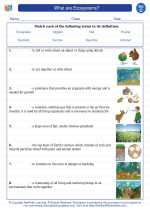What are Ecosystems?
An ecosystem is a community of living organisms (plants, animals, and microorganisms) interacting with each other and their physical environment. This includes both the biological and physical components of an environment.
Components of an Ecosystem
There are two main components of an ecosystem:
- Abiotic Factors: These are the non-living parts of the ecosystem, such as air, water, sunlight, soil, and temperature.
- Biotic Factors: These are the living organisms within the ecosystem, including plants, animals, and microorganisms.
Types of Ecosystems
Ecosystems can be classified into different types based on their characteristics:
- Terrestrial Ecosystems: These are land-based ecosystems, such as forests, grasslands, deserts, and tundra.
- Aquatic Ecosystems: These are water-based ecosystems, including freshwater (such as rivers and lakes) and marine (such as oceans and coral reefs) ecosystems.
Functions of Ecosystems
Ecosystems perform several important functions, including:
- Energy Flow: Ecosystems capture and transfer energy through the food chain, from producers (plants) to consumers (animals).
- Nutrient Cycling: Nutrients are recycled within an ecosystem, as decomposers break down organic matter and return essential nutrients to the soil.
- Regulation of Climate: Ecosystems help regulate local and global climate patterns through processes such as evapotranspiration and carbon sequestration.
- Supporting Biodiversity: Ecosystems provide habitats for a wide variety of plant and animal species, contributing to biodiversity.
Importance of Ecosystems
Ecosystems are critical for the survival of all living organisms, including humans. They provide essential services such as clean air and water, soil fertility, food, and raw materials. Additionally, they offer recreational and cultural benefits, and support the economy through activities like agriculture, fishing, and tourism.
Study Guide
Here are some key points to focus on when studying ecosystems:
- Describe the components of an ecosystem and give examples of abiotic and biotic factors.
- Identify and differentiate between terrestrial and aquatic ecosystems, providing examples of each.
- Explain the functions of ecosystems, including energy flow, nutrient cycling, climate regulation, and biodiversity support.
- Discuss the importance of ecosystems for both natural and human systems, and provide examples of ecosystem services.
Understanding ecosystems is crucial for understanding the interconnectedness of life on Earth and the impact of human activities on natural environments.
.◂Science Worksheets and Study Guides Third Grade. What are Ecosystems?
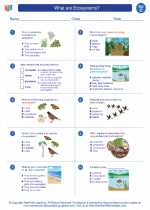
 Worksheet/Answer key
Worksheet/Answer key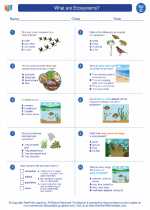
 Vocabulary/Answer key
Vocabulary/Answer key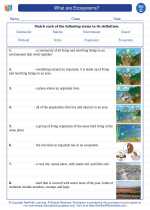
 Vocabulary/Answer key
Vocabulary/Answer key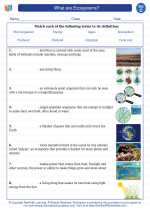
 Vocabulary/Answer key
Vocabulary/Answer key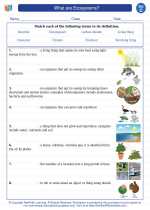
 Vocabulary/Answer key
Vocabulary/Answer key